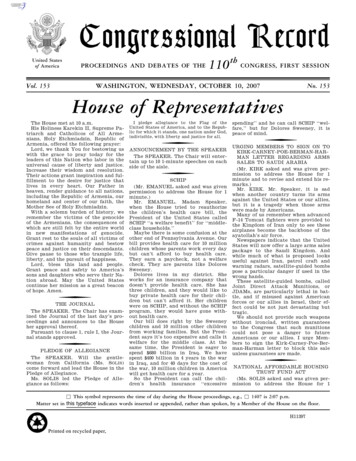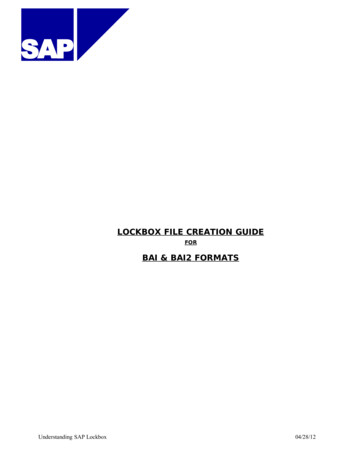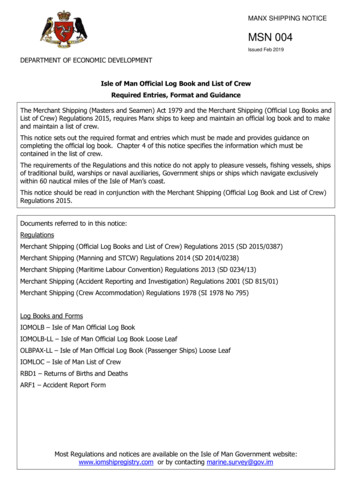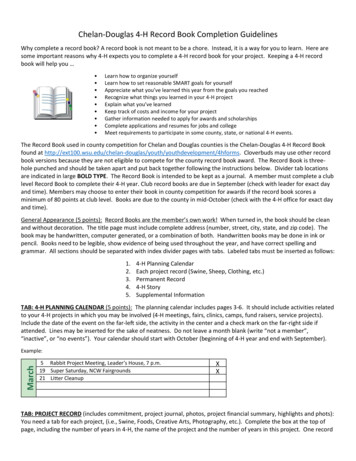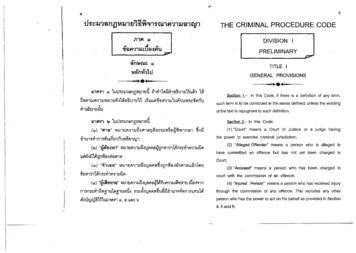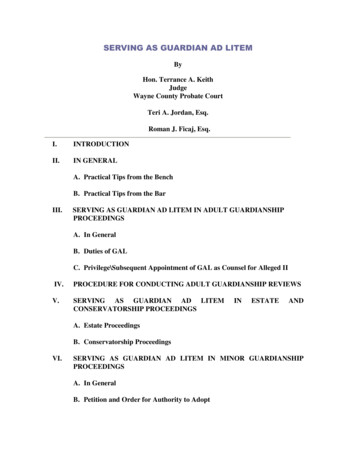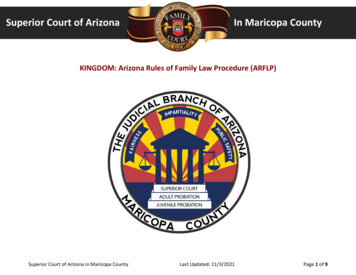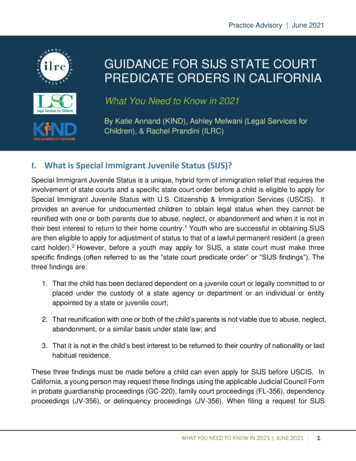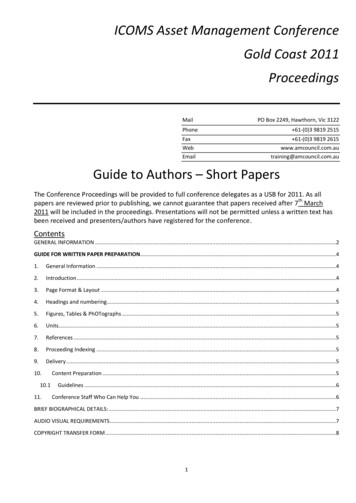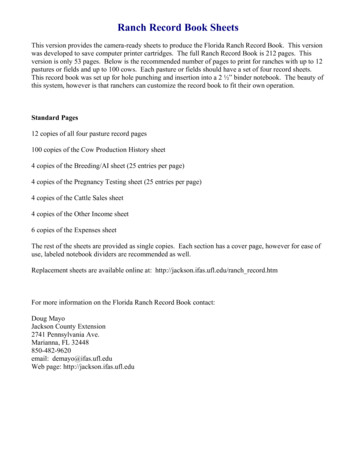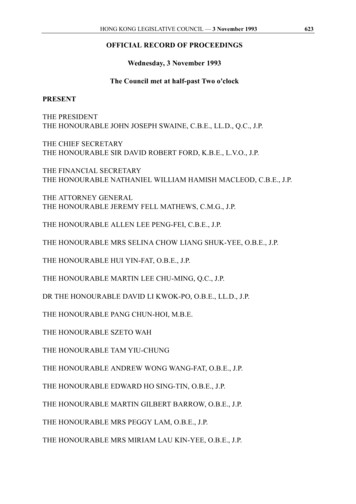
Transcription
HONG KONG LEGISLATIVE COUNCIL — 3 November 1993OFFICIAL RECORD OF PROCEEDINGSWednesday, 3 November 1993The Council met at half-past Two o'clockPRESENTTHE PRESIDENTTHE HONOURABLE JOHN JOSEPH SWAINE, C.B.E., LL.D., Q.C., J.P.THE CHIEF SECRETARYTHE HONOURABLE SIR DAVID ROBERT FORD, K.B.E., L.V.O., J.P.THE FINANCIAL SECRETARYTHE HONOURABLE NATHANIEL WILLIAM HAMISH MACLEOD, C.B.E., J.P.THE ATTORNEY GENERALTHE HONOURABLE JEREMY FELL MATHEWS, C.M.G., J.P.THE HONOURABLE ALLEN LEE PENG-FEI, C.B.E., J.P.THE HONOURABLE MRS SELINA CHOW LIANG SHUK-YEE, O.B.E., J.P.THE HONOURABLE HUI YIN-FAT, O.B.E., J.P.THE HONOURABLE MARTIN LEE CHU-MING, Q.C., J.P.DR THE HONOURABLE DAVID LI KWOK-PO, O.B.E., LL.D., J.P.THE HONOURABLE PANG CHUN-HOI, M.B.E.THE HONOURABLE SZETO WAHTHE HONOURABLE TAM YIU-CHUNGTHE HONOURABLE ANDREW WONG WANG-FAT, O.B.E., J.P.THE HONOURABLE EDWARD HO SING-TIN, O.B.E., J.P.THE HONOURABLE MARTIN GILBERT BARROW, O.B.E., J.P.THE HONOURABLE MRS PEGGY LAM, O.B.E., J.P.THE HONOURABLE MRS MIRIAM LAU KIN-YEE, O.B.E., J.P.623
624HONG KONG LEGISLATIVE COUNCIL — 3 November 1993THE HONOURABLE LAU WAH-SUM, O.B.E., J.P.DR THE HONOURABLE LEONG CHE-HUNG, O.B.E., J.P.THE HONOURABLE JAMES DAVID McGREGOR, O.B.E., I.S.O., J.P.THE HONOURABLE MRS ELSIE TU, C.B.E.THE HONOURABLE PETER WONG HONG-YUEN, O.B.E., J.P.THE HONOURABLE ALBERT CHAN WAI-YIPTHE HONOURABLE VINCENT CHENG HOI-CHUEN, J.P.THE HONOURABLE MOSES CHENG MO-CHITHE HONOURABLE MARVIN CHEUNG KIN-TUNG, J.P.THE HONOURABLE CHEUNG MAN-KWONGTHE HONOURABLE CHIM PUI-CHUNGREV THE HONOURABLE FUNG CHI-WOODTHE HONOURABLE FREDERICK FUNG KIN-KEETHE HONOURABLE TIMOTHY HA WING-HO, M.B.E., J.P.THE HONOURABLE MICHAEL HO MUN-KADR THE HONOURABLE HUANG CHEN-YATHE HONOURABLE SIMON IP SIK-ON, O.B.E., J.P.DR THE HONOURABLE LAM KUI-CHUNDR THE HONOURABLE CONRAD LAM KUI-SHING, J.P.THE HONOURABLE LAU CHIN-SHEKTHE HONOURABLE EMILY LAU WAI-HINGTHE HONOURABLE LEE WING-TATTHE HONOURABLE ERIC LI KA-CHEUNG, J.P.THE HONOURABLE FRED LI WAH-MINGTHE HONOURABLE MAN SAI-CHEONG
HONG KONG LEGISLATIVE COUNCIL — 3 November 1993THE HONOURABLE STEVEN POON KWOK-LIMTHE HONOURABLE HENRY TANG YING-YEN, J.P.THE HONOURABLE TIK CHI-YUENTHE HONOURABLE JAMES TO KUN-SUNDR THE HONOURABLE SAMUEL WONG PING-WAI, M.B.E., J.P.DR THE HONOURABLE PHILIP WONG YU-HONGDR THE HONOURABLE YEUNG SUMTHE HONOURABLE HOWARD YOUNG, J.P.THE HONOURABLE ZACHARY WONG WAI-YINDR THE HONOURABLE TANG SIU-TONG, J.P.THE HONOURABLE CHRISTINE LOH KUNG-WAITHE HONOURABLE ROGER LUK KOON-HOOTHE HONOURABLE ANNA WU HUNG-YUKTHE HONOURABLE JAMES TIEN PEI-CHUN, O.B.E., J.P.THE HONOURABLE ALFRED TSO SHIU-WAIABSENTTHE HONOURABLE NGAI SHIU-KIT, O.B.E., J.P.THE HONOURABLE LAU WONG-FAT, O.B.E., J.P.THE HONOURABLE RONALD JOSEPH ARCULLI, O.B.E., J.P.IN ATTENDANCEMR MICHAEL LEUNG MAN-KIN, C.B.E., J.P.SECRETARY FOR EDUCATION AND MANPOWERMR ALISTAIR PETER ASPREY, O.B.E., A.E., J.P.SECRETARY FOR SECURITY625
626HONG KONG LEGISLATIVE COUNCIL — 3 November 1993MRS ELIZABETH WONG CHIEN CHI-LIEN, I.S.O., J.P.SECRETARY FOR HEALTH AND WELFAREMR CHAU TAK-HAY, J.P.SECRETARY FOR TRADE AND INDUSTRYMR JAMES SO YIU-CHO, O.B.E., J.P.SECRETARY FOR RECREATION AND CULTUREMR ANTHONY GORDON EASON, J.P.SECRETARY FOR PLANNING, ENVIRONMENT AND LANDSMR GORDON SIU KWING-CHUE, J.P.SECRETARY FOR ECONOMIC SERVICESMR MICHAEL DAVID CARTLAND, J.P.SECRETARY FOR FINANCIAL SERVICESTHE CLERK TO THE LEGISLATIVE COUNCILMR CLETUS LAU KWOK-HONG
HONG KONG LEGISLATIVE COUNCIL — 3 November 1993627PapersThe following papers were laid on the table pursuant to Standing Order 14(2):SubjectSubsidiary LegislationL.N. No.Post Office (Amendment) Regulation 1993 93Port Control (Cargo Working Areas) (Amendment)(No. 2) Regulation 1993 ----------419/93Commodities Trading (Accounts and Audit) Rules -------------------------------------420/93Civil Aviation (Aircraft Noise) (Limitation onLanding or Taking Off of Aircraft) (Amendment)Notice -----------------------------421/93Copyright Ordinance (Amendment of Schedule)(No. 2) Notice 1993 ---------------422/93Specification of Public Office ------------423/93Sessional Papers 1993-94No. 20—The Hong Kong Industrial Estates Corporation Annual Report 1992-93No. 21—Director of Social Welfare Incorporated Statement of Accounts for theFinancial Year Ended 31 March 1992No. 22—Report by the Trustee of the Correctional Services Children's EducationTrust for the Period 1 September 1991 to 31 August 1992Oral answers to questionsCentralized and computerized medical records system1. MR HOWARD YOUNG asked: To save patients from having to go through the samemedical tests again on being transferred from one hospital to another and for speedypatient management, will the Government inform this Council whether it will considersetting up a centralized and computerized medical records system so that the patients'medical records can be transferred across hospitals?
628HONG KONG LEGISLATIVE COUNCIL — 3 November 1993SECRETARY FOR HEALTH AND WELFARE: Mr President, first, a word aboutmedical records generally : medical records contain privileged information which couldattract claims of confidentiality. No information can be released without the explicitconsent of the patient; or the information is required by law.The Hospital Authority is developing a comprehensive Information TechnologyStrategy which safeguards confidentiality of medical records while improving qualityand continuity of patient care. A territory-wide system of computerized Patient MasterIndex is being fully developed based on Identity Card numbers. This index will provideaccess to basic personal particulars, demographic data and brief medical histories ofpatients for doctors in all public hospitals.In the long term, the Patient Master Index will be expanded to include the clinicaldiagnosis of patients and types of treatment performed. This will be achieved initiallythrough the development of a medical records abstracting system, currently being pilotedin three hospitals. The system will be supplemented by a computerized laboratorymanagement/reporting system which will be introduced to nine major hospitals by 1997to provide clinical data on laboratory investigation. In addition, a pilot scheme will beintroduced in one hospital in 1994-95 to set up a pharmacy management system whichprovides data on drug prescription.MR HOWARD YOUNG (in Cantonese): Mr President, in regard to the system ofcomputerized Patient Master Index mentioned in the reply just now, has theAdministration assessed how high the costs of setting up such a system will be?Furthermore, considering that computer software very often is more expensive thanhardware, is there any software readily available from overseas, which in a way can saveconsiderable programming costs?SECRETARY FOR HEALTH AND WELFARE: Mr President, information technologydevelopment for the Hospital Authority was costed at 70 million in 1992-93 and 108million in 1993-94. The Government has committed funding of about 220 million for1994-95 and 1995-96. The exact comparison in terms of cost-benefit analysis with othercountries is not available but the advantage of maintaining the records is obvious in thatit does improve quality and ensure continuity of patient care. I would put the question ofthe availability of software to the Hospital Authority for their consideration.
HONG KONG LEGISLATIVE COUNCIL — 3 November 1993629DR LEONG CHE-HUNG: Mr President, could the Administration inform this Councilhow it will facilitate the request for details in respect of patients who happen to end up inthe care of a private practitioner or a private hospital? And how could a patient getdetails of his own records?SECRETARY FOR HEALTH AND WELFARE: Mr President, as I said in my main reply,medical records are privileged information between patients and their doctors. The legalprinciple is set out in Article 14 of the Hong Kong Bill of Rights Ordinance 1991, whichprovides that no one shall be subjected to arbitrary or unlawful interference with hisprivacy. No records can therefore be released without the explicit consent of the patientor unless the information is required by law.DR LAM KUI-CHUN: Mr President, since medical information is confidential but, ingeneral, software of computers is not, how does the Government propose to guaranteeconfidentiality of this information?SECRETARY FOR HEALTH AND WELFARE: Mr President, patients' medical recordscan only be accessed by authorized doctors on a strictly "need to know" basis. Securitymeasures, such as computer system passwords, have been built into the system to ensureconfidentiality. Even as Secretary for Health and Welfare, I can have no access to recordsnor can any other person.DR HUANG CHEN-YA (in Cantonese): Mr President, from my experience overseas, Ifeel that it is not uncommon that hospitals there merely use computers as a large wordprocessor. Data entered into it is not further analysed. Besides, laboratory test resultscannot reach the wards for no one has the time to enter the data into the computer. Couldthe Administration therefore assure us that the same mistake would not be made whencomputers are installed in hospitals in future, so as to ensure cost-effectiveness and thatthe data can be used for useful analysis?SECRETARY FOR HEALTH AND WELFARE: Mr President, yes, I will certainly lookinto this.MR MICHAEL HO (in Cantonese): Mr President, in general the biggest problem withcomputerization of patient's records in hospitals is how to have piles of records compiledand entered into a computer. Will the Administration inform this Council what measuresthere are to train sufficient staff to operate the computer system when it is in place?
630HONG KONG LEGISLATIVE COUNCIL — 3 November 1993SECRETARY FOR HEALTH AND WELFARE: Mr President, whilst the introduction ofa computerized information system will not lead to additional staff, the system will bemanaged by existing staff of the Hospital Authority. Nevertheless, training will have tobe provided so that the staff who operate the system will know the system and itsintricacies.DR CONRAD LAM (in Cantonese): Mr President, I would like to follow up Dr LEONG'ssupplementary. Since very often public hospital patients will go and consult privatepractitioners, will the Administration consider, subject to the consent of the patient,making these records accessible on-line to private practitioners in future?SECRETARY FOR HEALTH AND WELFARE: Mr President, the first part of theoperation will be to computerize the Patient Master Index. After the computerized systemis in place in the public hospitals, we intend to explore the possibility of extending thesystem to general clinics under the management of the Department of Health. In duecourse, it may be necessary to further extend it to the private sector, but we need to lookat it a step at a time."Comfort women" during Japanese occupation of Hong Kong2. MR JIMMY McGREGOR asked: Will the Government inform this Council whetherit is aware that the Japanese Military forcibly recruited some Hong Kong women asprostitutes during its occupation of Hong Kong from 1941 to 1945; if so,(a) whether any investigation was carried out, or any representations made to theJapanese Government, after World War II regarding this form of torture;(b) how many Hong Kong women were so brutalized, what attempts were made toassist them in starting a new life, and how many are still alive; and(c) whether it will consider opening a dialogue with the Japanese Government toseek some form of compensation for such brutalized women and their families?SECRETARY FOR SECURITY: Mr President,(a) It has not been possible, in the time available, to make a thorough search of thearchives relating to this period. The records which we have examined both hereand in London contain no reference to the forcible recruitment of "comfortwomen" in Hong Kong. Nor do
HONG KONG LEGISLATIVE COUNCIL — 3 November 1993631they mention any investigations into this subject immediately after World WarII, nor representations to the Japanese Government at that time. The JapaneseGovernment has advised that they have not received any approaches on thissubject from Hong Kong residents or associations.(b) We do not know how many women suffered in this way, nor how many, if any,are still alive. None has approached us for assistance, nor otherwise becomeknown to us.(c) If any such cases did become known to us, the Hong Kong Government wouldconsider sympathetically how we could assist them. But the scope for legalredress is constrained by the San Francisco Peace Treaty of 1951.MR JIMMY McGREGOR: Mr President, will the Hong Kong Government now seek toestablish whether any such atrocities were carried out in Hong Kong at that time byasking any person or organization with knowledge of the crime of forcibly recruiting socalled "comfort women" to come forward and provide the information to an appropriateand sympathetic agency which would of course maintain the highest level ofconfidentiality? Such information could be used to determine whether a case may existfor Hong Kong to seek some form of compensation from the Japanese Government,possibly as a grant to be used to help those who suffered during the Japanese occupation.And finally, can the Government advise this Council on the extent of the constraintsmentioned by the Secretary, presumably under Article 14 of the San Francisco Treaty?Do they include crimes which have nothing to do with the conduct of war?SECRETARY FOR SECURITY: Mr President, the best way for any individuals, orindeed other people with information on this subject, to make this known to theGovernment would be through the Social Welfare Department, and in particular theFamily Services Division of the Social Welfare Department. As I have said, we havenever received any information on this subject, but we would obviously consider itsympathetically if we did receive any such information.As regards the second part of the question, I am advised that the arrangements madeunder the San Francisco Treaty of 1951 and subsequent payments made by the JapaneseGovernment fully discharged their obligations for the damage and suffering causedduring the war and that there would be no legal basis for further claims on the JapaneseGovernment. This does not necessarily mean that there would not be a basis for moralclaims.
632HONG KONG LEGISLATIVE COUNCIL — 3 November 1993MR HENRY TANG: Mr President, I am wondering whether the Secretary, in the courseof carrying out his search through the archives, has found any instances of men beingforced into immoral acts during the war.PRESIDENT: Mr TANG, I think you are going beyond the scope of the question. Wouldyou like to rephrase your question? I am not sure I understood it.MR HENRY TANG: Mr President, I am wondering whether the Secretary, in the courseof searching through the archives for information on women being recruited to becomeprostitutes during the Japanese occupation, has discovered any instances also of menbeing so recruited.DR PHILIP WONG: Mr President, can the Secretary elaborate a bit further on what theSan Francisco Peace Treaty of 1951 is all about?SECRETARY FOR SECURITY: Mr President, that was the peace treaty made betweenJapan and the allied powers.DR HUANG CHEN-YA (in Cantonese): Mr President, the Secretary said in his replythat no women had approached the Government for assistance. It may be because they donot know exactly how to seek assistance. Can the Administration give assurances that,firstly, it will make known to the public which department they can approach forassistance or reporting the case; secondly, it will negotiate with Japan on howcompensation should be made on receipt of such information?SECRETARY FOR SECURITY: Mr President, as I said in answer to a previoussupplementary, I think that they may well be — if there are any such women — reluctantto come forward. But the department where they should come forward to is the SocialWelfare Department who will, of course, treat any information that they receive inconfidence. I cannot say what we would do. We have not received any such cases. Wewould obviously have to consider them.DR HUANG CHEN-YA (in Cantonese): Mr President, I am not asking which departmentto approach. My question is: Will the Administration make known to the public (by wayof public announcement) which department will handle these case, that is, by means ofpublic education?
HONG KONG LEGISLATIVE COUNCIL — 3 November 1993633SECRETARY FOR SECURITY: I am sorry, Mr President, I do not understand thequestion. I thought I said very clearly that people who wish to report such cases shoulddo so to the Family Services Division of the Social Welfare Department.DR HUANG CHEN-YA: Mr President, I had better speak in English. What I was askingis this: Would the Secretary make certain, by means of public education or publicity, thatthe people who may want to report such cases can know where they should report suchcases to, because these women may not know who they should be reporting theirproblems to?SECRETARY FOR SECURITY: Mr President, there has been quite some considerablepublicity on this whole subject, not relating to Hong Kong but relating to other countriesin the region, earlier this year. And as I have said, the result of that has been that no suchcases have come forward in Hong Kong If anybody did wish to report it then they shoulddo so to the Social Welfare Department and I hope that that information will get reported.MR SZETO WAH (in Cantonese): Mr President, the Liberal Democratic Government ofJapan has been in power for a long time until recently. The attitude of the HosokawaGovernment towards war is different from that of the past Administrations. Will the HongKong Government take this opportunity to raise the issues of "comfort women" and"compensation" with Japan through the British Government acting on behalf of HongKong?PRESIDENT: I think your question really goes way beyond elucidating the answer, MrSZETO Wah. You will have to narrow it.MR SZETO WAH (in Cantonese): Mr President, given that the new HosokawaGovernment has a different attitude towards wars in the past, will the Administrationinform this Council whether it will gather information on recruitment of "comfortwomen" in Hong Kong and seek "compensation" from the Japanese Government?SECRETARY FOR SECURITY: Mr President, it is the case that the previous JapaneseGovernment, in fact the outgoing Japanese Government, did issue an apology earlier thisyear to all the women who suffered in this way and I believe that that apology wasrepeated by the present Japanese Government more recently. I think that the question issomewhat hypothetical, as I have said we have no information of any such cases in HongKong. If we did receive information on any such cases then we would consider in whatway we could assist them.
634HONG KONG LEGISLATIVE COUNCIL — 3 November 1993MR JIMMY McGREGOR: Mr President, would the Secretary not agree that it would beentirely appropriate for the Hong Kong Government to take the initiative to ask peoplewhether there is such information available? It would be extremely unlikely for suchpeople, having stayed silent for 50 years, to come forward now of their own volitionunless they were sure that the Hong Kong Government wished to have that informationand could make use of it.SECRETARY FOR SECURITY: Mr President, yes, I believe and hope that, if there areany such cases, the publicity that will no doubt ensue from the question being raised inthis meeting will encourage people to come forward. That is why I have tried to indicatehow they should come forward.Treason or theft of state secrets3. MR JAMES TO asked (in Cantonese): In the light of Article 23 of the Basic Law,which requires the Hong Kong Special Administrative Region to enact laws to prohibit,among other things, any act of treason or theft of state secrets, etc, will the Governmentinform this Council:(a) whether the local legislation to replace the United Kingdom Offical Secrets Act1989 is being drafted; if so, whether the Chinese Government will be consultedon the draft to ensure compatibility with the above Article and when therelevant Bill(s) will be introduced into this Council; and(b) whether provisions on treason and other offences against the crown under theCrimes Ordinance (Cap. 200) will be reviewed; if so, when the review isexpected to be completed?SECRETARY FOR SECURITY: Mr President, as the Attorney General explained to thisCouncil in answer to a question on 13 October, we have a programme for localizingcertain United Kingdom enactments which now apply to Hong Kong, the substance ofwhich with any necessary changes we would wish to see continuing to apply here after30 June 1997; and also a programme to adapt Hong Kong laws so that on 1 July 1997they will be consistent with the Basic Law.Local legislation to replace the United Kingdom Official Secrets Acts has not been,and is not yet being, drafted. However, we have done some work on this subject, and Iexpect to put proposals to the Executive Council in the next few months.
HONG KONG LEGISLATIVE COUNCIL — 3 November 1993635We are also reviewing the provisions in the Crimes Ordinance relating to treasonand other offences against the Crown. Here again, I expect to put proposals to theExecutive Council in the next few months.We will wish in due course to discuss these matters with the Chinese.MR JAMES TO (in Cantonese): Mr President, the Secretary says in the third paragraphof his reply that the provisions in the Crimes Ordinance relating to treason and otheroffences against the Crown are under review. According to recent reports, the question ofsubversion on the part of Members was brought up during Sino-British talks when theconcept of "through train" was referred to. Can the Secretary inform this Council, in thecourse of reviewing the Crimes Ordinance and during negotiations with China in future,what the approach and principles will be when discussing with the Chinese Governmentacts of subversion against the Central People's Government referred to in Article 23 ofthe Basic Law, so that Members can have a smooth transition from 1995 to beyond 1997?SECRETARY FOR SECURITY: Mr President, I do not think I can answer any questionson the "through train". But I think what I can say is this: subversion per se is notmentioned in the Crimes Ordinance and is not an offence under Hong Kong law atpresent. We have not yet formulated our proposals on how we might adapt thoseprovisions in the Crimes Ordinance. But in general I think we would be likely to proposeretaining the law as it is with only such necessary changes as are required to reflect thechange of sovereignty on 1 July 1997.MR LEE WING-TAT (in Cantonese): Mr President, will the Administration explainfurther the term treason in the context of the Crimes Ordinance (Cap 200)? If a group ofdemonstrators led by public figures chanted: "Down with the British Government","Down with the Queen" and "Down with Chris PATTEN", will their acts constitutetreason or subversion?SECRETARY FOR SECURITY: Mr President, I do not think that I can answer thatquestion. I cannot give legal advice at all, let alone in the abstract.PRESIDENT: Would you like to rephrase your question, Mr LEE?MR LEE WING-TAT (in Cantonese): Mr President, although the Secretary cannot givean oral reply now, he may supply a written answer as to whether such acts will consitutetreason or subversion.
636HONG KONG LEGISLATIVE COUNCIL — 3 November 1993PRESIDENT: You are asking for an answer to a hypothetical legal question, Mr LEE.MR LEE WING-TAT (in Cantonese): Mr President, that is not a hypothetical question.In the past, there were in fact people who chanted in the street: "Down with the BritishGovernment". So I am only seeking legal advice as to whether such an act constitutestreason or subversion.PRESIDENT: Secretary?SECRETARY FOR SECURITY: I am afraid, Mr President, I cannot answer thatquestion.MR LEE WING-TAT (in Cantonese): Mr President, if the Secretary cannot answer thisquestion which involves legal concepts, can other public officers provide legal advice oranswer?MR ANDREW WONG (in Cantonese): Point of order, Mr President. Under theprovisions of Standing Order 18(1)(h), "A question shall not be asked for the purpose ofobtaining an expression of opinion, the solution of an abstract legal question, or theanswer to a hypothetical proposition." So the question is out of order.PRESIDENT: Was your question, Mr LEE, asking whether the persons who did what yousay did happen committed an offence under the present law of treason? Is that what youare asking?MR LEE WING-TAT (in Cantonese): Mr President, the instances I referred to in myquestion did happen in Hong Kong during the riots in 1967 when demonstrators chanted:"Down with the British Government" and "Down with the Queen". Now I am onlyseeking legal opinion on whether such acts constitute treason and subversion under theexisting laws.PRESIDENT: I think what you might be permitted to do is to ask whether anyprosecutions were brought, Mr LEE. Could an answer be supplied in writing, Secretary?
HONG KONG LEGISLATIVE COUNCIL — 3 November 1993637SECRETARY FOR SECURITY: Yes, Mr President. (Annex I) I do not know the answerto that now, but perhaps I should say that I do believe that there have been noprosecutions for treason within living memory.MR MAN SAI-CHEONG (in Cantonese): Mr President, when drafting or amending therelevant legislation, will the Administration consider the difference in certain legalconcepts between China and Hong Kong in particular those concerning treason, theft ofstate secrets and other acts against the Government? In this connection, will theAdministration inform this Council whether there are intentions to consult Hong Kong'slegal profession especially the Bar Association and the Law Society to ensure that HongKong's future legislation will be acceptable to more LegCo Members?SECRETARY FOR SECURITY: Mr President, as I say, we have not yet formulated ourproposals and we have not yet consulted the Executive Council. So I cannot at this stagesay what proposals we will come up with nor how we will proceed with them. But if wedo bring forward any legislation, clearly it will be for the Legislative Council to thendecide and make its decision on that draft legislation.MR MAN SAI-CHEONG: Mr President, a point of clarification.PRESIDENT: Yes, but keep it short, Mr MAN.MR MAN SAI-CHEONG: Mr President, if that is the case, can I ask whether theGovernment is intending to consult the Law Society and the Bar Association?SECRETARY FOR SECURITY: Mr President, no, we have no such intention at present.MR CHEUNG MAN-KWONG (in Cantonese): Mr President, if the question asked by MrLEE Wing-tat just now is considered a "hypothetical" one, can the Administration informthis Council whether it will seek legal advice on the legal definitions of terms like"treason" or "subversion" and make them known to Hong Kong people and theLegislative Council? At the same time, will the legal definitions as agreed to by the HongKong Government be brought to the attention of the Chinese Government?
638HONG KONG LEGISLATIVE COUNCIL — 3 November 1993SECRETARY FOR SECURITY: Mr President, I am not sure that I understand thequestion. The offence of treason and other offences against the Crown are clearly set outin the Crimes Ordinance. There must be a lot of law and legal precedents on preciselywhat these mean.DR YEUNG SUM (in Cantonese): Mr President, it is mentioned in the second paragraphof the Secretary's reply that the Administration has no intention of localizing the UnitedKingdom Official Secrets Acts. Does the Administration know that when our relationshipwith Britain comes to an end in 1997, the United Kingdom Official Secrets Acts willbecome invalid in the absence of the localization of the Acts? Why has the Administrationstill not stepped up its efforts in this regard though it is fully aware of the situation?SECRETARY FOR SECURITY: Mr President, I did not say we had no intention oflocalizing it. What I did say is that we had not yet drafted any local legislation. It is asubject we are working on and we expect to put proposals to the Executive Council in afew months' time.International telephone services rates4. MR LAU CHIN-SHEK asked (in Cantonese): Will the Government inform thisCouncil whether consideration will be given to requesting the Hong Kong TelecomInternational Limited to make public any agreement reached with overseastelecommunications companies on the accounting rates in respect of internationaltelephone services as well as the relevant data? If not, how can the Government assurethe public that the Hong Kong Telecom International Limited, currently one of the largesttelecommunications service providers in Hong Kong, will not employ pricediscrimination measures against its competitors?SECRETARY FOR ECONOMIC SERVICES (in Cantonese): Mr President, to begin withI would like to give Members the background on the accounting rates system.Accounting rates were introduced in the early part of the twentieth century, whennational telephone companies were not allowed to operate in other countries and so hadto rely on their overseas counterparts to deliver calls to their final destination. Theaccounting rate is a charge for this service. It is normally expressed as a per minute fee,and is paid on the difference between outgoing and incoming traffic. In other words iftraffic is in balance no money changes hands.Over recent years, because the number of outgoing calls from Hong Kong exceedincoming ones, Hong Kong Telecom International (HKTI) has been making netoutpayments to
THE HONOURABLE JAMES TO KUN-SUN DR THE HONOURABLE SAMUEL WONG PING-WAI, M.B.E., J.P. . (Accounts and Audit) Rules ----- 420/93 Civil Aviation (Aircraft Noise) (Limitation on Landing or Taking Off of Aircraft) (Amendment) . considering that computer software very often is more expensive than hardware, is there any software readily available .
